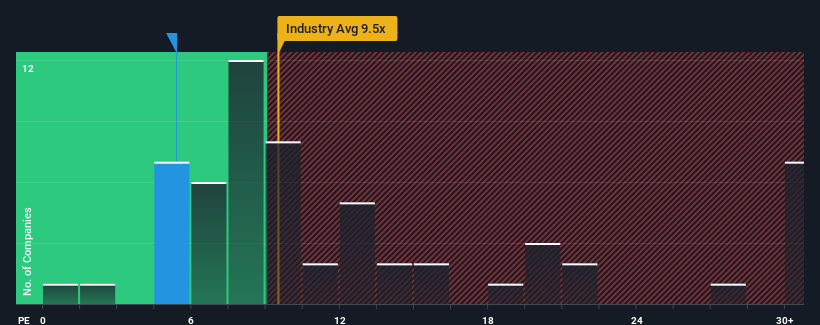- Japan
- /
- Metals and Mining
- /
- TSE:5401
Investors Aren't Buying Nippon Steel Corporation's (TSE:5401) Earnings

Nippon Steel Corporation's (TSE:5401) price-to-earnings (or "P/E") ratio of 5.4x might make it look like a strong buy right now compared to the market in Japan, where around half of the companies have P/E ratios above 15x and even P/E's above 24x are quite common. Although, it's not wise to just take the P/E at face value as there may be an explanation why it's so limited.
Nippon Steel hasn't been tracking well recently as its declining earnings compare poorly to other companies, which have seen some growth on average. It seems that many are expecting the dour earnings performance to persist, which has repressed the P/E. If this is the case, then existing shareholders will probably struggle to get excited about the future direction of the share price.
View our latest analysis for Nippon Steel

How Is Nippon Steel's Growth Trending?
In order to justify its P/E ratio, Nippon Steel would need to produce anemic growth that's substantially trailing the market.
Retrospectively, the last year delivered a frustrating 4.5% decrease to the company's bottom line. At least EPS has managed not to go completely backwards from three years ago in aggregate, thanks to the earlier period of growth. Accordingly, shareholders probably wouldn't have been overly satisfied with the unstable medium-term growth rates.
Turning to the outlook, the next three years should bring diminished returns, with earnings decreasing 0.07% each year as estimated by the ten analysts watching the company. That's not great when the rest of the market is expected to grow by 11% each year.
With this information, we are not surprised that Nippon Steel is trading at a P/E lower than the market. Nonetheless, there's no guarantee the P/E has reached a floor yet with earnings going in reverse. Even just maintaining these prices could be difficult to achieve as the weak outlook is weighing down the shares.
The Key Takeaway
Generally, our preference is to limit the use of the price-to-earnings ratio to establishing what the market thinks about the overall health of a company.
As we suspected, our examination of Nippon Steel's analyst forecasts revealed that its outlook for shrinking earnings is contributing to its low P/E. Right now shareholders are accepting the low P/E as they concede future earnings probably won't provide any pleasant surprises. It's hard to see the share price rising strongly in the near future under these circumstances.
There are also other vital risk factors to consider before investing and we've discovered 2 warning signs for Nippon Steel that you should be aware of.
If P/E ratios interest you, you may wish to see this free collection of other companies with strong earnings growth and low P/E ratios.
Valuation is complex, but we're here to simplify it.
Discover if Nippon Steel might be undervalued or overvalued with our detailed analysis, featuring fair value estimates, potential risks, dividends, insider trades, and its financial condition.
Access Free AnalysisHave feedback on this article? Concerned about the content? Get in touch with us directly. Alternatively, email editorial-team (at) simplywallst.com.
This article by Simply Wall St is general in nature. We provide commentary based on historical data and analyst forecasts only using an unbiased methodology and our articles are not intended to be financial advice. It does not constitute a recommendation to buy or sell any stock, and does not take account of your objectives, or your financial situation. We aim to bring you long-term focused analysis driven by fundamental data. Note that our analysis may not factor in the latest price-sensitive company announcements or qualitative material. Simply Wall St has no position in any stocks mentioned.
About TSE:5401
Nippon Steel
Engages in steelmaking and steel fabrication, engineering and construction, chemicals and materials, and system solutions businesses in Japan and internationally.
Flawless balance sheet established dividend payer.


